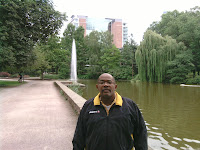
9º ANO.
7101- Present continuous tense auxiliary to be forms: am, is, are; pronouns: I, you, he, she, and it.
Exer7101 (describes an action that is going on at the present time, an action which goes on now or at the present moment and an action that occurs every day or all the time)
7102- Present continuous tense auxiliary to be form: are; plural pronouns: we, you and they.
Exer7102 (describes an action that is going on at the present time, an action which goes on now or at the present moment and an action that occurs every day or all the time)
7103- Review exercise 1. (describes an action that is going on at the present time, an action which goes on now or at the present moment and an action that occurs every day or all the time)
7104- Present continuous tense NEGATIVE form auxiliary to be form: am not, is not and are not; singular pronouns: I, you, he, she and it.
Exer7104: negative form
7105- Present continuous tense NEGATIVE form auxiliary to be form: are; plural pronouns: we, you and they.
Exer7105: negative form
7106- Review exercise 2: present continuous tense affirmative, negative.
7107- Present continuous tense QUESTION or INTERROGATIVE form singular and plural
7108- Review exercise 3: question form
7109- Review present continuous tense affirmative, negative and question form
7110- Review exercise 4
7111- Object pronouns singular: me (I), him (he), her (she), it (it), you (you).
Exer7111
7112- Object pronoun plural: us (we), you (you), them (they)
Exer7112
7113- Verb there to be present tense singular form: there is, (affirmative form).
Exer7113
7114- Verb there to be present tense plural form: there are, (affirmative form).
7115- Verb there to be present tense singular form: there is, (NEGATIVE form).
Exer7115
7116- Verb there to be present tense plural form: there are, (NEGATIVE form).
Exer7116
7117- Text 1[to explore language rules (grammar)]
Exer7117
7118- Text (oral training)
Exer7118
7119- Music (oral training)
Exer7120
7121- Project: International woman day.
7122- Work paper: vocabulary
1) saudações: bom dia, boa tarde, etc
2) família
3) objetos e material escolar,
4) cores,
5) frutas,verduras
6) nomes de animais
7) alimentos diversos
8) partes da casa,
9) nacionalidades: brasileiro, americano, etc
10) profissões,
11) peças do vestuário,
12) corpo humano,
13) dias da semana,
14) meses do ano,
15) estação do ano,
16) Números de 1 até 100
Nota:
De 1 em 1 até 30
De 10 em 10 até 100
De 100 em 100 até 1.000
OBSERVAÇÃO
1o) Fazer caderno
2o) Individual
3o) Com figuras
FUNCTIONS OF THE LANGUAGE
- To introduce themselves and to give opinion
- To speak and to ask of the citizen
- To describe people
- To speak about events in the present and the past time.
- To speak on occupations, to tell events in the present and the past,
►Pesquise vocabulário [aqui no blog]
 CONTEÚDO 1ªUNIDADE.
CONTEÚDO 1ªUNIDADE.01- Review present tense to be: singular and plural, affirmative, negative and question forma
02- Review personal pronoun: singular (I, he, she, it, you) and plural (we, you, they),
03- Review simple present tense: affirmative, negative and question form.
04- Uses of: can (ability), likes, dislikes,
05- Uses of: I like + noun,
06- Vocabulary: occupation,
07- Object pronoun: singular and plural,
08- Possessive pronoun: singular and pronoun,
09- Vocabulary: animals’ names,
10- Adjectives
11- Adjective superlative degree,
12- Vocabulary: family members,
13- Personality adjectives (short and long)
14- Have as possession,
15- First, next, then finally,
 CONTEÚDO 2ªUNIDADE.
CONTEÚDO 2ªUNIDADE.16- Going to future structure and conceptions (intensions and predictions),
17- Going to future: affirmative form,
18- Going to future: negative form,
19- Going to future: question form,
20- Vocabulary: days of the week, months of the year, seasons,
21- Will future structure and conceptions
22- Will future: affirmative form,
23- Will future: negative form,
24- Will future: question form,
25- Verb there to be (there was, there were): affirmative, negative and question forms,
26- Nouns: countable and uncountable,
27- Adverbs: more, less, fewer.
28- Ordinal numbers 1 to 30.
 CONTEÚDO 3ªUNIDADE.
CONTEÚDO 3ªUNIDADE.29- Simple past tense or past simple regular verb: affirmative form,
30- Simple past tense or past simple regular verb: negative form (did not or didn’t),
31- Simple past tense or past simple regular verb: question form,
32- Simple past tense or past simple irregular verb: affirmative form,
33- Simple past tense or past simple irregular verb: negative form,
34- Simple past tense or past simple irregular verb: question form,
35- Question words + past tense question form (question words + did question)
36- Vocabulary: ways of transportation, travel expressions,
37- Preposition off, out, of, into
38- Vocabulary: time expressions,
39- Modal verbs: may and might (affirmative, negative and question forms)
8 ano, antiga 7a série.
 CONTEÚDO 1ªUNIDADE.
CONTEÚDO 1ªUNIDADE.40- Conditional sentences: first conditional = if + present + will / conditions,
41- Vocabulary: human body,
42- Uses of: there will be, there may be, there might be; must, mustn’t + infinitive form for obligations,
43- Vocabulary: occupation
44- Uses of: too = adjective
45- Vocabulary: health, diseases,
46- Preposition of movement,
47- Preposition of place,
48- Uses of the expression ‘what’s the matter with you?’ (heath problems, diseases, sickness)
49- Too + adjective
50- Vocabulary: tourism,
51- Vocabulary: food,
52- How much and how many,
53- Uses of: a lot of, a few and a little
53- Going to future (future procedures): affirmative form,
53- Going to future (future procedures): negative form,
53- Going to future(future procedures): question form,







Nenhum comentário:
Postar um comentário